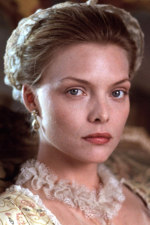Alice Agnew
 |
|
| Portrayed by Michelle Pfeiffer (unofficial/NPC) | |
| Full Name | Alice Aisling Agnew née Prescott |
|---|---|
| Associated Noble House(s) | Abingdon, Eyeries |
| Date of Birth | 15 July 1763 |
| Father | Lewis Prescott |
| Father's Rank | 8th Earl of Eyeries |
| Mother | Aoife Prescott née Keenan (Ó Cianáin) |
| Mother's Rank | Daughter of landed gentry |
| Town Residence | Abingdon House, 64 Mount Street |
| Year of Debut | 1780 |
| Dowry | None |
| Year of Marriage | 1780 |
| Spouse | Fitzwilliam Agnew |
| Spouse's Rank | 11th Marquess of Abingdon |
| Year of Widowhood | 1798 |
| Issue | Louis (b. 1781), Philippa (b. 1794) |
Alice Agnew, Marchioness of Abingdon (née Lady Alice Prescott) is the mother of Louis Agnew, 12th Marquess of Abingdon, and Lady Philippa Agnew. She was born 15 July 1763 in Aughnanure Castle (Caisleán Achadh na nlubhar in Irish) in County Galway in Ireland to Lewis Prescott, 8th Earl of Eyeries, and Aoife Prescott née Keenan, Countess of Eyeries. She married Fitzwilliam Agnew, 11th Marquess of Abingdon, in 1780 when she was seventeen.
Alice is a non-player character created by Casey.
History
Alice comes from a privileged background, that of an Anglo-Irish noble family during the historical Protestant Ascendancy. But her mother died of liver cancer when she was eight years old; her father never remarried. Their finances were dire. Her father had mortgaged their home multiple times to pay the debts from their unproductive estate and their tenants were close to starving. Consequently, Alice was sent to live with relations in England when she was twelve years old and until her marriage only returned once a year to see her father.
Although her status as a poor cousin was never in doubt, Alice was treated well by her guardians and she enjoyed her adolescence. Her father could not give her money for a dowry when it was time for her début but he paid as much as he could for her presentation and social upkeep. Her relations provided the rest. She was generally acknowledged as one of the most beautiful débutantes of that year. Unfortunately, her family's circumstances were widely known and she was not expected to make a good match.
At a ball thrown in honour of her foster sister's engagement, Alice met the Marquess of Abingdon, a reserved man in his thirties. She was startled when he asked her to dance; she'd been under the impression he paid her no attention following their brief introduction. Theirs was a quiet set but afterwards he fetched her a drink and asked about Ireland. They talked for the rest of the evening but when her foster mother asked whether she thought the marquess had any romantic interest, she answered in the negative. He had given no indication that he admired her and conversed with her much as an older brother would.
Alice was wrong. Within three months the marquess had proposed, her lack of dowry notwithstanding, and within six months they were married. It was a totally unforeseen match and viewed by many as imprudent. Nevertheless, the usually serious-minded Fitzwilliam had fallen in love with kind, thoughtful Alice and desperately wished to marry her, despite all objections. Their first child, Louis, Viscount Lowerton, was born in 1781. She suffered two miscarriages and a stillbirth before their second child, Lady Philippa, was born thirteen years later, in 1794.
In 1797, Pippa suffered an accident while out riding with Louis. A year later, Fitzwilliam died and seventeen-year-old Louis became Marquess of Abingdon. Alice, still reeling from her daughter's disability, was devastated by her husband's death and sunk into a period of depression that lasted a year. Her sole pleasure was to care for her daughter; though she wished to do the same for her son, she could not support him as he needed. She had neither the education nor the willpower. Her sister-in-law's husband, the 10th Duke of Claitonborough, became a mentor to the new marquess and, guiltily, she let him take over her son's development.
In 1811, Alice has finally decided to take her daughter to London to make her début, as she has grown worried that they live too much in isolation. She is also desirous that her son should marry soon and is determined at the very least to find an eligible woman, since her preference for him (a love match) seems overly optimistic. For the first time in over a decade, she has left Hithe for Abingdon House in London and currently resides there with her children.